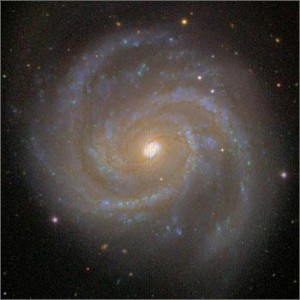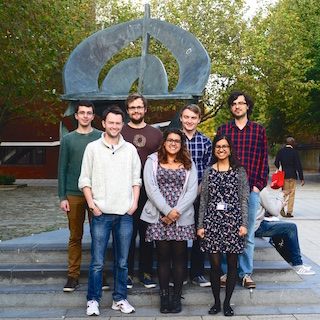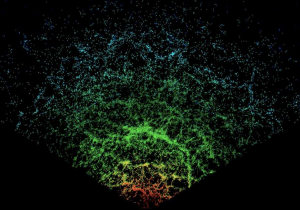THIS PAGE HAS BEEN MOVED. PLEASE EDIT https://www.icg.port.ac.uk/fellowships-at-the-icg/
Talk in Oxford, LSST meeting
https://fbeutler.github.io/static/Oxford_2018.pdf
Donald Lynden-Bell: a tribute
It seems an obvious fact that galaxies formed through gravitational collapse. And we all know that quasars are powered by accretion onto supermassive black-holes. But perhaps not everyone knows whom we owe this knowledge to. Donald Lynden-Bell passed away in February 2018. Since the beginning of my studies I was intrigued by the notion of an early collapse that would explain why the Milky Way halo contains the most ancient stars and why the metal content increases towards the inner parts of galaxies. The monolithic collapse model of Donald has accompanied my thoughts until I was lucky enough to be part of a Club where I could dine in his company … In front of a rich chocolate pudding I remember a conversation where we shared the puzzling thinking that the biggest galaxies seem to be the oldest. How could we explain this? Did we need another Universe? Perhaps, but first we needed another chocolate … It was always a pleasure to dine in Donald’s company, his radiant optimism and open smile were illuminating the dining room as much as his articles have enlightened generations of astronomers …. As Ruth his wife says ‘Donald loved to attend the Club to be able to meet younger astronomers and see how the world was changing’ … He gave the impression to be happy, and this is how I want to remember him. In admiration and memory of Professor Donald Lynden-Bell, Professor of Theoretical Astrophysics, Gold and Eddington Medal of the Royal Astronomical Society, Director of the Cambridge Institute of Astronomy, Member of the Seven Samurai, and more.
Talk at Nice Euclid meeting
Hundreds turn out for a night of stargazing
Map of the cosmos ‘sees’ the dark Universe
South Coast Cosmology meeting 2017
Talks:
- Bill Wright, “Massive neutrinos in fast, approximate simulations of large scale structure formation” (slides)
Professor/Reader in Gravitational Wave Science
Employment type: Permanent
Employment basis: Full time
Salary: Competitive and commensurate with the senior responsibilities of the role
Position number: ZZ602850
Closing date: 31 March 2017
Interview date: 18 – 21 April 2017
We seek an established leader in gravitational wave (GW) science to create a new research group in the Institute of Cosmology and Gravitation (ICG). This new GW initiative would complement existing research at the ICG, and there is the possibility of making multiple hires in support of this new initiative (see forthcoming advert for Senior Lecturer in GW science).
The ICG is a world-leading research institute in cosmology and astrophysics. In REF2014 96% of our research outputs were judged internationally excellent or world leading. We are now looking to expand into gravitational wave research, supported by external research funding and recently-opened undergraduate courses in Physics. We encourage applications from scientists with a strong background of
- high impact publications related to gravitational waves
- grant funding
- leadership
- innovation and impact
Applications can be either for a Professorship or Readership in GW science, dependent on track record to date. We particularly encourage applications from traditionally under-represented groups in science. The ICG and the University of Portsmouth hold Athena SWAN bronze awards and we are an Institute of Physics Project Juno Supporter. These projects show a commitment to introduce organisational and cultural practices that promote gender equality in science and create a better working environment for men and women.
The ICG consists of 12 academic staff, 19 postdoctoral researchers and over 20 PhD students, and has an active international visitors programme. ICG has major involvement in
- Sloan Digital Sky Survey (SDSS-IV)
- Dark Energy Survey (DES)
- Large Synoptic Survey Telescope (LSST)
- Dark Energy Spectroscopic Instrument (DESI)
- ESA’s Euclid satellite mission
- Square Kilometre Array (SKA)
The University of Portsmouth is a member of the South-East Physics Network (SEPnet) and hosts the 3704-core SCIAMA supercomputer. More information can be found at http://www.icg.port.ac.uk/
You may wish to contact the existing ICG co-Directors, Profs Bob Nichol (bob.nichol@port.ac.uk) and David Wands (david.wands@port.ac.uk) to discuss this exciting opportunity and your application. Your application (application form, CV) should be submitted via the online application system by the closing date.
For detailed information about the vacancy or to apply, please select this link: ZZ602850 – Professor/Reader in Gravitational Wave Science
PhD Studentships 2017
The Institute of Cosmology & Gravitation at the University of Portsmouth is one of the leading groups in research on cosmology and astrophysics in the UK. We are active participants in a wide range of international collaborations, including the Dark Energy Survey (DES), the Sloan Digital Sky Survey (SDSS-IV) and Euclid.
PhD studentships starting in October 2017 will be available for research in:
- Galaxy evolution
- Stellar population modelling
- Very early Universe
- Dark energy
- Testing gravity on cosmological scales
- Large scale structure
- Gravitational lensing
- Supernovae
Applications should reach us by 17th February 2017, but will be considered until the positions are filled.
PhD applicants should have or expect to obtain a good honours degree or equivalent in Physics, Maths or Astronomy. Applicants should send a CV and a brief statement of research interests, and arrange for up to 2 letters of recommendation to be emailed directly to icg-admin@port.ac.uk, or posted to:
Research Administrator
Institute of Cosmology and Gravitation
Dennis Sciama Building
Burnaby Road
Portsmouth PO1 3FX
UK
We welcome applications from all qualified applicants, but applications are particularly encouraged from traditionally under-represented groups in science. The University of Portsmouth holds an Athena SWAN bronze award and is an Institute of Physics Project Juno Supporter; these projects show a commitment to introduce organisational and cultural practices that promote gender equality in science and create a better working environment for men and women.
Scientific staff members:
Dr David Bacon
Dr Marco Bruni
Prof Rob Crittenden
Prof Kazuya Koyama
Prof Roy Maartens
Prof Claudia Maraston
Dr Karen Masters
Prof Bob Nichol
Prof Will Percival
Prof Daniel Thomas
Prof David Wands
Dr Daniel Whalen
Please also note the following PhD opportunities in our region:
SEPnet PhD Scholarships

©SDSS
Take nine world-class University Physics Departments. Bring together their research, knowledge and resources. The result is SEPnet.
SEPnet offers PhD programmes focused on the future of physics with scholarships to match. You will optimise the opportunity to enter your preferred field of research with your single application considered by nine universities: Hertfordshire, Kent, the OU, Portsmouth, Queen Mary, Royal Holloway, Southampton, Surrey and Sussex. Our partners offer over 100 PhD projects every year. These projects and SEPnet Scholarships are available in the following areas of research:
- Astrophysics
- Particle Physics
- Quantum Technology and Condensed Matter
- Medical and Bio-Physics
- Theoretical Physics
- Atmospheric and Climate physics
Scholarships come with additional research training support from SEPnet of up to £500 per year which may be used for travel to conferences or overseas experiments.
The SEPnet Graduate Network (GRADnet)
GRADnet provides an extensive regional training programme for postgraduate researchers including physics training and professional skills development. For more information visit: http://www.sepnet.ac.uk/study/phd-opportunities/
How to Apply:
Applicants are invited to submit their current C.V. and a short statement of their research interests (max. 200 words) to Cristobel Soares-Smith, SEPnet Graduate Network Administrator, gradnetadmin@sepnet.ac.uk. Selected candidates will be invited to attend an Open Day in order to meet potential supervisors and learn more about GRADnet.
We welcome applications from all qualified applicants, but applications are particularly encouraged from traditionally under-represented groups in science. The University of Portsmouth holds an Athena SWAN bronze award and is an Institute of Physics Project Juno Supporter; these projects show a commitment to introduce organisational and cultural practices that promote gender equality in science and create a better working environment for men and women.


